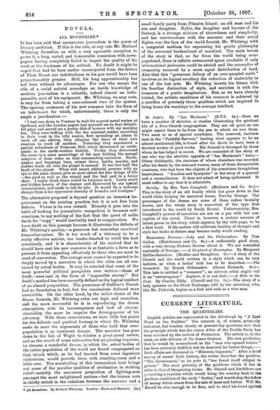NOVELS.
ALL MOONSHINE.* IT has been said that anonymous journalism is the grave of literary ambition. If this is the rule, at any rate Mr. Richard Whiteing furnishes us with a very agreeable exception to prove it, a long, varied, and honourable connexion with news- papers having completely failed to impair the quality of his work or the freshness of his outlook. No doubt it might be urged that had he been earlier emancipated from the fetters
of Fleet Street our indebtedness to his pen would have been proportionately greater. Still, his long apprenticeship has not been without its advantages. For one who essays the role of a social satirist nowadays an inside knowledge of modern journalism is a valuable, indeed almost an indis- pensable, part of his equipment. Mr. Whiteing, we may note, is very far from taking a rose-coloured view of the system. The opening sentences of his new romance take the form of an indictment for which, unfortunately, there is only too ample a justification :— " I had run down to Yentnor to wait for a great naval review at Spithead, and the London papers had pursued me to that delight- ful place and served me a pretty dish of horrors with my morning tea. They were trifling with the too constant reader, according to their wont in the silly season, first spreading an alarm to work off one edition, then allaying the fears of their own creation to work off another. Yesterday they announced a partial subsidence of Primrose Hill, which threatened an earth- quake in the nerth-western district. To-day they discovered the cause in a mere assemblage of fat men holding the annual congress of their order on that commanding eminence. Earth- quakes and burnings here, crimes there, battle, murder, and sudden death all over the planet it seemed. It was but half the fault of the planet. When will smart editorial persons with an eye to the main chance give us more about the fine things of life —the good as well as the stupid and the bad, and in a fairer show. I really think there would be ha'pence in it. Lowly merit and hidden beauty of the sterner sort discovered by our special commissioner, and made to tell its tale. It would be a welcome change from a too oppressive eternity of bounder and hooligan."
The alternative proposed is beyond question an immense im-
provement on the existing practice, but it is not free from defects. Virtue is its own reward. Directly it gets into the habit of looking for journalistic recognition it becomes self- conscious, to say nothing of the fact that the quest of noble deeds for "copy" would inevitably tend to exaggeration. We have dwelt on this passage because it illustrates the defects of Mr. Wbiteing's quality,—a generous but somewhat uncritical humanitarianism. He is too much of a visionary to be a
really effective satirist, too tender-hearted to wield the lash mercilessly, and it is characteristic of his method that he should have cast his new romance in so fantastic a form as to prevent it from appealing effectively to those who are most in need of conversion. The average man cannot be expected to be deeply moved by a narrative in which the roles are all sus-
tained by astral bodies. It may be retorted that some of the most powerful political pamphlets ever written—those of Swift—were cast in the form of "impossible stories." But Swift's method has been correctly defined as the logical conduct
of an absurd proposition. The premisses of Gulliver's Travels had no foundation in fact, but the conclusions deduced were
irresistible. On the other hand, by the initial choice of the dream formula, Mr. Whiteing rules out logic and causation, and the more successful he is in reproducing the dream atmosphere, with its inconsequence and lack of circum- stantiality, the more he impairs the driving-power of his advocacy. With these reservations, we have little but praise for the delicate and poetical fantasy in which Mr. Whiteing seeks to meet the arguments of those who hold that over-
population is an imminent danger. The narrator has gone down to the Isle of Wight to witn6ss a great naval review,
and as the result of some exhaustive but perplexing inquiries, he dreams a wonderful dream, in which the astral bodies of the entire population of the world are found congregated on that island, which, as he had learned from some ingenious statistician, would provide them with standing-room and a little over. The marshalling of this tremendous host brings out some of the peculiar qualities of civilisation in striking relief—notably the enormous proportion of fighting-men amongst the most enlightened nations—but the human note is chiefly struck in the relations between the narrator and a
• All Boo:whim. By Richard Whiteing. London : Hurst and Blackett. [Qe.]
small family party from Pitcairn Island: an old man and his son and daughter. Nykie, the daughter and heroine of the fantasy, is a strange mixture of shrewdness and simplicity, and her conversations with the narrator and their astral flights over the face of the world furnish Mr. Whiteing with a congenial medium for expressing his gentle philosophy of the universal brotherhood of mankind. The main lesson of the story is that, so far from the world being over- populated, there is infinite untenanted space available if only international jealousies could be abated and the anomalies of ownership removed by a more equal distribution of land. Also that this "gruesome fallacy of an over-peopled earth" involves as its logical corollary the reduction of maternity to one of the lost arts. Mr. Whiteing invests his theme with his familiar distinction of style, and enriches it with the treasures of a poetic imagination. But, as we have already hinted, the artistic excellence of his romance is achieved by a sacrifice of precisely those qualities which are required to bring home his warnings to the average intellect










































 Previous page
Previous page